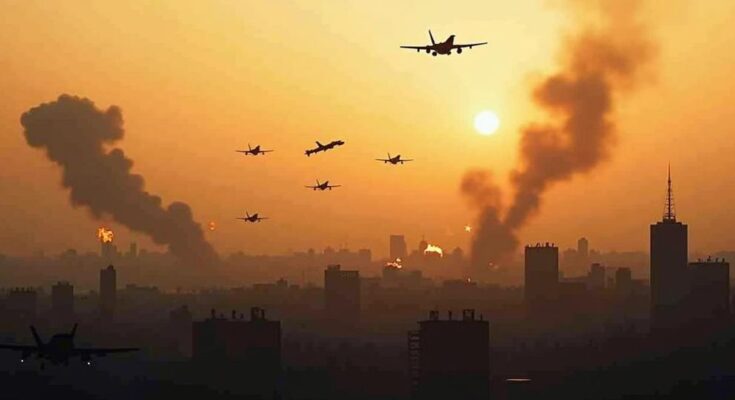Israel has executed a series of airstrikes in Beirut, affecting the Masnaa border crossing with Syria amid escalating conflicts with Hezbollah. The Israeli military offensive follows recent attacks on key Hezbollah leaders and involves active ground engagement. Iran’s influence in the region intensifies as the situation risks broader ramifications for regional stability.
Israel has escalated its military operations in Lebanon, conducting significant airstrikes in the southern suburbs of Beirut and effectively severing the Masnaa border crossing between Lebanon and Syria. This series of airstrikes is part of a broader conflict involving Israel and the Lebanese militia, Hezbollah, which has intensified following Israel’s directive for civilians to evacuate areas in southern Lebanon that are outside a United Nations-designated buffer zone. The Israeli military launched a ground incursion on Tuesday, clashing with Hezbollah operatives in a confined area near the border. This action followed a wave of assaults that resulted in the deaths of prominent Hezbollah figures, including the organization’s longstanding leader, Hassan Nasrallah. In a related development, Iranian Foreign Minister Abbas Araghchi arrived in Beirut to confer with Lebanese officials regarding the ongoing hostilities with Israel. His visit came shortly after Iran launched a substantial missile barrage against Israel, reflecting the rapidly deteriorating situation between the parties involved and raising concerns about a potential regional conflict. The airstrikes in Beirut produced enormous explosions, generating vast clouds of smoke and flames that were visible from considerable distances within the Lebanese capital. While the Israeli military has not specified its targets, reports indicate over ten consecutive airstrikes occurred late Thursday. Moreover, the airstrike led to the closure of the crucial Masnaa Border Crossing, which has been a vital passage for thousands fleeing the violence in Lebanon over recent weeks. Video footage portrayed the aftermath, with significant damage evident along the road and civilians traversing on foot after being dropped off by vehicles hindered from proceeding. The closure of this major crossing represents a significant moment, as it is the first disruption since the onset of the war. Israeli officials have alleged that Hezbollah has been attempting to transport military supplies through the crossing, which Hezbollah has historically relied on for weapons, primarily funneled from Iran through Syria. Despite this closure, other border crossings remain functional under state supervision. Since the outbreak of conflict following Hamas’ attack on October 7, 2023, which claimed the lives of 1,200 Israelis and resulted in 250 captives, hostilities have persisted along the Israeli-Lebanese border, with daily exchanges of fire. As Israel intensifies its military campaign against Hamas in Gaza, which has resulted in significant Palestinian casualties, the interconnectedness of these conflicts is becoming increasingly evident.
The article highlights the current intensification of military actions between Israel and Hezbollah, reflecting a year-long conflict that has escalated following recent events. The context includes Iran’s significant role as a supporter of Hezbollah and the implications of border dynamics in relation to the ongoing violence in the region. With the situation involving both ground incursions and airstrikes, it underscores the complexities and the rapid developments that have characterized the warfare in and around Lebanon and Israel since October 2023. This period has seen rising casualties and increased geopolitical tensions in the Middle East.
In summary, the situation in Lebanon remains dire as Israel conducts aggressive operations against Hezbollah, resulting in severe damage and loss of life. The closure of the Masnaa border crossing represents a significant development in the ongoing conflict, complicating humanitarian movements. Meanwhile, the involvement of Iran and the potential for a wider regional dispute amplify the seriousness of the confrontation. As hostilities persist, the ramifications for both Lebanese and Israeli citizens continue to escalate, presenting urgent challenges that require attention and resolution.
Original Source: nypost.com




